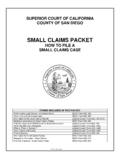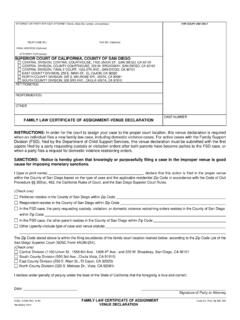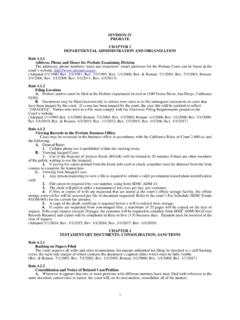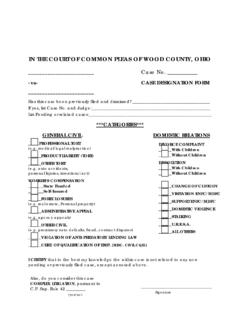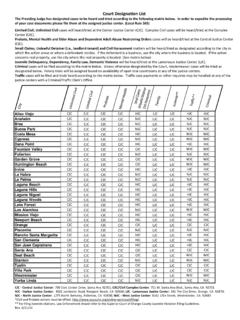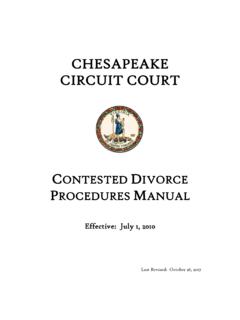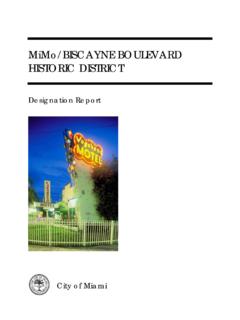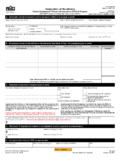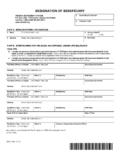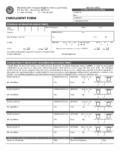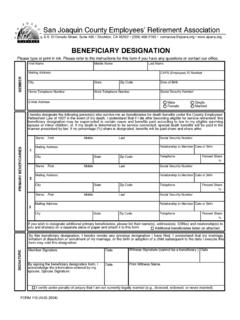Transcription of GENERAL A. B. C. D. E. F. DUTIES OWED IN PROCEEDINGS ...
1 1 GENERAL A. Lawyers must observe all rules of law, including the california Rules of Professional Conduct and the State Bar Act, particularly Business and Professions Code section 6068. B. Lawyers should honor their commitments. C. Lawyers should honor and maintain the integrity of our system of justice. D. Lawyers should not compromise their integrity for the sake of a client, case or cause. E. Lawyers should conduct themselves in a professional manner. F. Lawyers should be guided by a fundamental sense of fair play in all professional dealings. DUTIES OWED IN PROCEEDINGS BEFORE THE court A. Lawyers should always be courteous and respectful to the court . B. Lawyers should always be candid with the court . C. Lawyers and clients appearing in court should dress neatly and appropriately. D. Lawyers should be on time. E. Lawyers should be prepared for all court appearances.
2 F. Lawyers should attempt to resolve, by agreement, their differences relating to procedural and discovery matters. G. Lawyers should discourage and decline to participate in litigation that is without merit or is designed primarily to harass or drain the financial resources of the opposing party. H. Lawyers should avoid any communication, direct or indirect, about a pending case with a judge except as permitted by court rules or otherwise authorized by law. I. Lawyers should refrain from impugning the integrity of the judicial system, its PROCEEDINGS , or its members. DUTIES OWED TO MEMBERS OF THE BAR A. Lawyers must remember that conflicts with opposing counsel are professional and not personal; vigorous advocacy is not inconsistent with professional courtesy. B. Lawyers should treat adverse witnesses, litigants and opposing counsel with common courtesy, good manners, fairness, and due consideration.
3 C. Lawyers should not be influenced by ill feelings or anger between clients in their conduct, attitude or demeanor toward opposing counsel. D. Lawyers should conduct themselves in discovery PROCEEDINGS as they would if a judicial officer were present. E. Lawyers should not use discovery to harass the opposition or for any improper purpose. F. Lawyers should not intentionally make any misrepresentation to an opponent. G. Lawyers should not arbitrarily or unreasonably withhold consent to a just and reasonable request for cooperation or accommodation. H. Lawyers should not attribute to an opponent a position not clearly taken by the opponent. I. Letters intended to make a record should be scrupulously accurate. J. Lawyers should not propose stipulations in the presence of the trier of fact unless previously agreed to by the opponent.
4 K. Lawyers should avoid interrupting an opponent's legal argument unless there is a legitimate basis for an appropriate objection. L. Lawyers in court should address opposing lawyers through the court . M. Lawyers should not seek sanctions against another lawyer to obtain a tactical advantage or for any other improper purpose. N. Lawyers should inspire and encourage opposing counsel to conform to the standards in this code and to amicably resolve related disputes promptly, fairly and reasonably, with resort to the court for judicial relief only if necessary. O. Lawyers should conduct themselves so that they may conclude each case with a handshake with the opposing lawyer. 2 DIVISION I GENERAL AND ADMINISTRATIVE CHAPTER 1 SCOPE OF RULES These rules apply to all cases filed in or transferred to the courts of San Diego County. Rule Construction Citation and Effect of Rules These rules are known and cited as the "San Diego Superior court Rules" and are at all times supplementary to and subject to statutes, the california Rules of court , and any rules adopted by the Judicial Council and are to be construed and applied so they do not conflict with such rules and statutes.
5 These rules have no retroactive effect or application. (Adopted 1/1/1998; Rev. 1/1/2000; Rev. 1/1/2004; Renum. 1/1/2006) Rule Construction and Application of Rules These rules will be construed to secure the efficient administration of the business of the court and to promote and facilitate the administration of justice by the court . Division, section, rule, and paragraph headings do not affect the scope, meaning, or intent of the provisions of these rules. If any part of a rule is held invalid, all valid parts that are severable from the invalid parts remain in effect. If a rule is held invalid in one or more of its applications, the rule remains in effect in all valid applications that are severable from the invalid applications. (Adopted 1/1/1998; Rev. 1/1/2000; Renum. 1/1/2006) Rule Definition of Words The definitions set forth in the california Rules of court for the trial courts apply to these rules with equal force and for all purposes, unless the context or the subject matter requires otherwise.
6 Answer includes response. Case management conference includes what was formerly referred to as status conference. Complaint includes cross-complaint and petition. County means the County of San Diego, State of california . court means the Superior court of the County of San Diego and includes any judge, commissioner, referee, and temporary judge currently serving on the bench of any division in the county. Day means a calendar day, unless otherwise specified. Defendant includes cross-defendant and respondent. Party, or other designation of a party, includes such party's attorney of record. Plaintiff includes cross-complainant and petitioner. Rule refers to a rule of the San Diego Superior court , unless otherwise indicated. (Adopted 1/1/1998; Rev. 1/1/1999; Rev. 1/1/2000; Rev. 1/1/2004; Renum. 1/1/2006) Rule New, Amended, Repealed Rules Any rule may be amended or repealed, and new rules may be added by majority vote of the judges of the San Diego Superior court .
7 (Adopted 1/1/1998; Rev. 1/1/2000; Renum. 1/1/2006) CHAPTER 2 GENERAL RULES Rule Policy Against Bias and Access to court Services It is the policy of the court to provide an environment free of all types of bias, prejudice, any kind of discrimination, or unfair practice, including that based on citizenship status, race, color, national origin, ancestry, sex (including pregnancy, childbirth, and related medical conditions), age, religion, disability: physical or mental, genetic information, marital status, sexual orientation, gender identity and gender expression, AIDS/HIV, medical condition, political activities or affiliations, military or veteran status, or status as a victim of domestic violence, assault, or stalking. All judges, commissioners, referees, court officers, and court employees must perform their DUTIES in a manner calculated to prevent any such conduct, either by court personnel or by those appearing in court in any capacity.
8 This rule does not preclude legitimate comment or advocacy when such factors are raised as issues in court PROCEEDINGS . To ensure access to the courts for persons with disabilities, the court has appointed ADA coordinators at each of its facilities to address requests for accommodation. Such requests shall be made as far in advance as possible and 3 pursuant to california Rules of court , rule This rule is not intended to impose limitations or to invalidate the remedies, rights, and procedures accorded to persons with disabilities under state or federal law. More information about accommodations for disabilities can be found on the court s website, To increase access to limited-English-proficient ( LEP ) court users, the court offers language access assistance, including interpreters. Whenever possible given available resources and in accordance with applicable law, the court will provide language access services to LEP court users in all areas of the court .
9 To facilitate efficient scheduling of interpreters, court users are asked to request interpreters as far in advance as possible, and to advise the court as soon as possible when an interpreter is no longer needed. Further information, including information concerning obtaining an interpreter and for making complaints about language access, may be obtained from the Language Access page on the court s website, Any violation of the above policies should be reported directly to the presiding judge or executive officer. Any violation of these policies by persons appearing in court should be reported directly to the judicial officer before whom the PROCEEDINGS were conducted. (Adopted 1/1/1998; Rev. 1/1/2000; Renum. 7/1/2001; Renum. 1/1/2006; Rev. 1/1/2017; Rev. 1/1/2018) Rule Departments, Divisions of the court , and Venue A. The court consists of all the departments and divisions wherever they may be located and whatever their function.
10 These include all facilities located within the North County, East County, South County, and Central Divisions. The hours of operation are published in the professional and legal newspapers in the county, on the court s website, and posted in each courthouse. B. In addition to the trial departments of each division, there is a presiding or supervising department and other specialized departments as determined by the presiding judge. The supervising judge at each location is responsible for the administrative and calendar operations of the departments located there and for assignment of PROCEEDINGS in those cases that are filed there. C. Except as set forth otherwise below or elsewhere provided in these rules, venue for all cases will be according to the zip codes found on the court s website at D. The following matters must be filed in the Central Division: 1. Matters now heard on the mental health calendar of the court , including all PROCEEDINGS under the Lanterman-Petris-Short Act, except permanent conservatorships; 2.
